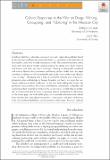Files in this item
Cultural responses to the war on drugs : writing, occupying, and ‘public-ing’ in the Mexican City
Item metadata
| dc.contributor.author | O'Hare, Patrick | |
| dc.contributor.author | Bell, Lucy | |
| dc.date.accessioned | 2020-05-14T15:30:03Z | |
| dc.date.available | 2020-05-14T15:30:03Z | |
| dc.date.issued | 2020-05-14 | |
| dc.identifier | 267301346 | |
| dc.identifier | 9f7df17b-e514-4953-9a11-6d795e626257 | |
| dc.identifier | 000532579300010 | |
| dc.identifier | 85084596499 | |
| dc.identifier.citation | O'Hare , P & Bell , L 2020 , ' Cultural responses to the war on drugs : writing, occupying, and ‘public-ing’ in the Mexican City ' , City & Society , vol. 32 , no. 1 , pp. 203-227 . https://doi.org/10.1111/ciso.12259 | en |
| dc.identifier.issn | 0893-0465 | |
| dc.identifier.other | ORCID: /0000-0003-2535-2881/work/74118209 | |
| dc.identifier.uri | https://hdl.handle.net/10023/19944 | |
| dc.description | This research was made possible by an Arts and Humanities Research Council (AHRC) grant (No: AH/P005675/1). | en |
| dc.description.abstract | Cardboard publishers (editoriales cartoneras) are small, independent publishers linked by the recovered cardboard that covers their books, a commitment to the promotion of local authors, and a drive to make literature accessible. This cultural movement, whose actors often form part of broader social movements, has spread across Latin America and beyond, with other 250 active collectives. Drawing on ethnography conducted with some of Mexico’s thirty cartoneras, and literary analysis of their texts, this paper contributes to debates on violence and public space in the context of the brutal Mexican “war on drugs”. Dialoguing with a body of scholarship spanning from Setha Low’s pioneering urban anthropology to Jacques Rancière’s art theory, we argue that cartoneras might be considered “public‐ers”, in that their book‐making labor involves the production not just of books, but of new social relations, communities, and publics. By analyzing aesthetic materials in relation to the social contexts in which they are embedded, we demonstrate that decisions to denounce violence and perform its alternatives on the written page, and in the public plaza, are inseparable and intertwined cultural forms of action that create affective encounters, contact zones, and spaces of dissensus in the city. | |
| dc.format.extent | 25 | |
| dc.format.extent | 939887 | |
| dc.language.iso | eng | |
| dc.relation.ispartof | City & Society | en |
| dc.subject | Cardboard publishing | en |
| dc.subject | Social movements | en |
| dc.subject | Urban space | en |
| dc.subject | Dissensus | en |
| dc.subject | Violence | en |
| dc.subject | GN Anthropology | en |
| dc.subject | DAS | en |
| dc.subject | SDG 16 - Peace, Justice and Strong Institutions | en |
| dc.subject.lcc | GN | en |
| dc.title | Cultural responses to the war on drugs : writing, occupying, and ‘public-ing’ in the Mexican City | en |
| dc.type | Journal article | en |
| dc.contributor.institution | University of St Andrews. Philosophy | en |
| dc.contributor.institution | University of St Andrews. Social Anthropology | en |
| dc.identifier.doi | https://doi.org/10.1111/ciso.12259 | |
| dc.description.status | Peer reviewed | en |
| dc.date.embargoedUntil | 2020-05-14 |
This item appears in the following Collection(s)
Items in the St Andrews Research Repository are protected by copyright, with all rights reserved, unless otherwise indicated.

